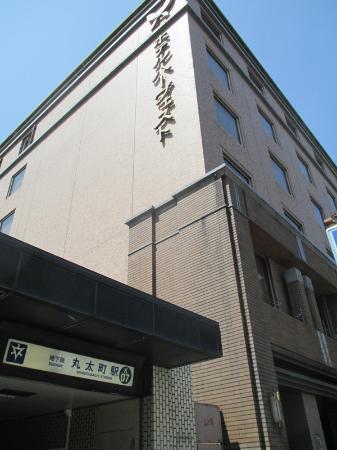Page 2 of 2
 Last week (31 July), Roxy-Pacific agreed to buy Hotel Harvest Kyoto comprising six floors and one basement and the land it sits on in Kyoto city, Japan, for ¥2.26 billion (about SGD27.5 million). Photo: tripadvisor.com
Last week (31 July), Roxy-Pacific agreed to buy Hotel Harvest Kyoto comprising six floors and one basement and the land it sits on in Kyoto city, Japan, for ¥2.26 billion (about SGD27.5 million). Photo: tripadvisor.comQ: How did you come to acquire the Kyoto hotel and what's your plan for it?
Teo Hong Lim: Japan has been an exciting market because of Abenomics and prices have gone up and foreign funds have gone in. The focus was on commercial and residential. The yield is about 4% but their funding cost is low and you can earn a bit of spread.
A negative is a lot of the rental cannot be adjusted which is similar to the rent control situation in Singapore decades ago. You want to increase the rent but the tenant resists and you can't boot him out, you may have to take him to court.
As for the hotel we bought, an ex-investment banker had proposed it to us. In Japan, most hotels have 20-to-30 year leases and you get 4-5% yield -- that's all.
Room rates can go up but your yield is still only 4-5%. But this hotel is a unique opportunity because by next year, we will have a vacant building, and we can refresh it and reposition it.
Q: Over the next three years, you have the scope to deploy, by my calculations, as much as S$1 billion of capital, including leverage. Can you talk a bit about where you will move Roxy to?
Teo Hong Lim: You are right that the liquidity we have access to is quite a lot. Our strategy is to keep some liquidity, instead of using up everything.
In overseas markets, we are not experts yet. To do property development, you need to know the contractors there, how to control costs, etc. We have put in bids as JV partners in Australia but we didn't get the sites. It's just like in Singapore previously where foreign developers tried to get sites but the local developers were more efficient in cost control and in building design.
We would like to invest in buildings like Goulburn which is an investment with a twist - and we can take our time to do design with the architects there and enhance the value. It's not about just getting a building with a long lease and make net 2% yield. Our shareholders will not be happy with that.
If we charge into buying a lot of properties in London and Australia, the next moment the Singapore market may recover and that's the one where all our skills set is in. We can't ignore our home market.
In Australia, you can buy land in a good location for AUD20-30 million but the construction cost is close to AUD200 million for a 60-70 storey skyscraper. You can sell everything but you are allowed to collect only 10% upfront. There have been instances when the market slowed down in the 4-5 years it takes to build and a lot of buyers disappeared.
That's why, in Australia and London, seasoned developers approach us with opportunities and say, "We manage things for you, I charge a fee, and share in the profit but I don't put in any capital." They don't want to carry the risk of a project.
Our strategy if we do 300-400 units is we may do it through a JV or we look for low-rise development of five 6-storey blocks. We will sell in phases.
Q: Sales of your Trilive project (launched in June 2014) have been slow. Do you intend to offer price incentives?
Teo Hong Lim: Unless it's 30-40%, a price reduction cannot cure the problem. Developers who drop price by 20% can sell maybe another 10-20% of a project but they are still stuck with many unsold units.
A lot of developers holding stock cannot come down 20% because the projects will start to bleed. And if you cut price by 20%, it doesn't mean buyers will come.
There are multiple issues -- oversupply in the market, and poor sentiment too. Some buyers' affordability are affected by government rules.
For Trilive, we can do some finetuning. Now we will just let the project rest. If the buyer sentiment is not there, there is no point pushing it.
Many developers are facing QC (Qualifying Certificate) issue. But for Roxy, those projects we launched in 2012 are all 100% sold. We won't face any QC issue until 3 years later. Trilive was acquired last year, so we have 5 years to sell for the ABSD issue, and 5 years to build and 2 years to sell for the QC issue. (For information on the intricacies of the QC and ABSD, see IRAS guide and Rodyk and Davidson LLP guide)
For Roxy-Pacific's Powerpoint materials for the 2Q results, click here.
Recent stories:
ROXY-PACIFIC: 1Q net profit up 27%, unbooked revenue stands at S$1 billion
ROXY-PACIFIC's AGM: Seeking opportunities post-property boom in S'pore







